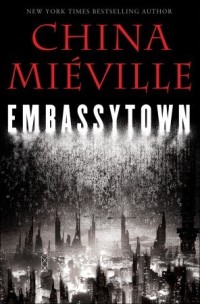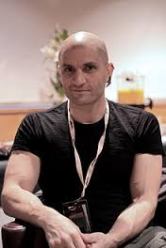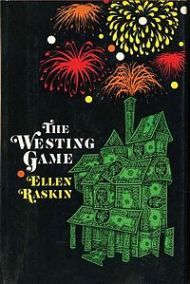 At one point, after coming across a reference to the difference between langue and parole in China Miéville’s Embassytown, I said to my husband, “This guy must have some kind of background in language theory or the philosophy of language, because he’s throwing around jargon like a grad student.” The next day I googled him, and it turns out I was right, or at least partially so. Miéville has a Ph.D. in International Relations from the London School of Economics, and published a book based on his dissertation, a Marxist analysis of international law, in 2005. As a good Marxist scholar, I’m sure he’s read Volosinov and Bakhtin, among others, and he seems steeped in theory of all kinds, so I think my original guess was a fair one.
At one point, after coming across a reference to the difference between langue and parole in China Miéville’s Embassytown, I said to my husband, “This guy must have some kind of background in language theory or the philosophy of language, because he’s throwing around jargon like a grad student.” The next day I googled him, and it turns out I was right, or at least partially so. Miéville has a Ph.D. in International Relations from the London School of Economics, and published a book based on his dissertation, a Marxist analysis of international law, in 2005. As a good Marxist scholar, I’m sure he’s read Volosinov and Bakhtin, among others, and he seems steeped in theory of all kinds, so I think my original guess was a fair one.
The problem is that the theory that often makes for fascinating and revolutionary scholarly work also makes terrible fiction if not handled carefully. That’s not to say that there are not masterful works of fiction that also address complex theoretical issues through form, structure, narrative, dialogue, plot, and other means. But it takes a special touch to pull this off and still make the work entertaining and beautiful. David Mitchell serves as one example of a great writer who addresses larger theoretical and formal issues through intricately constructed, aesthetically gorgeous fictions. His Cloud Atlas is probably the most ambitious work of fiction ever written in this vein, the theory quite literally entwined with the narrative.
Mieville’s Embassytown is not as successful, to be judicious. Oddly for a book with a plot this convoluted, it’s mostly boring. Without attempting to summarize the entire twisty story, suffice it to say that it centers on an alien planet where humanoid creatures live as the guests and trading partners of the native alien life form, which communicates in a unique, non-signifying, doubled language. That is to say, they have two mouths out of which they speak simultaneously, but everything they speak must have a real-world referent: there is no abstraction, no metaphorization, and, most importantly, no lying. Ultimately, the most interesting part of the novel, which comprises about the last quarter of the book, centers on the question of lying as the key to signifying language that allows for a plasticity of thought necessary for survival. Even here, though, the text descends into Derridean obfuscation: “Similes are a way out. A route from reference to signifying. Just a route, though. But we can push them down it….To where the literal becomes….something else. If similes do their job well enough, they turn into something else. We tell the truth best by becoming lies.” Huh?
Miéville’s work is usually classified as science fiction or fantasy, and he’s won a lot of awards in these genres. I haven’t read anything else of his, so his other books might be of much better quality, but unfortunately it seems to me that the awards belie much lower standards in what we call “genre” fiction than “literary” fiction. (Incidentally, if Miéville is a good Marxist scholar, he would probably deny the validity of the distinction.) There are some other contemporary writers who, in recent years, have tried hard to blur the boundaries between these categories with much more success. One need only think of Michael Chabon’s work (especially The Yiddish Policemen’s Union) or, again, of David Mitchell to know that literary fiction can be genre fiction, and vice versa, or maybe that those categories are just not particularly useful. The problem with a book like Embassytown is that, in an apparent attempt to create a theoretical, literary work of science fiction it only reinforces the categories it seems intent on breaking down, reminding its readers with every plodding sentence that there is something better out there.




